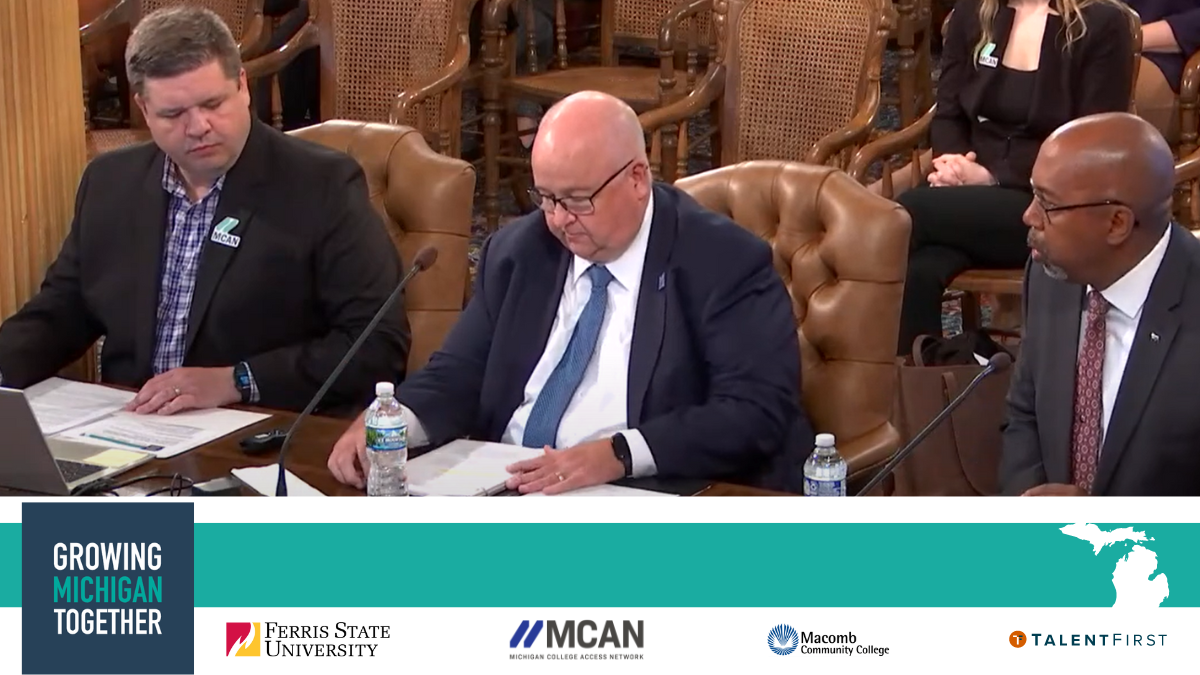
On June 5, 2024, MCAN Executive Director Ryan Fewins-Bliss testified before the Michigan House Higher Education Committee and House Appropriations Subcommittee on Higher Education and Community Colleges. Fewins-Bliss, a member of the Growing Michigan Together Higher Education Workgroup, spoke in favor of the recommendations created by GMTC for increased access to higher education in Michigan.
- Recommendation 1: Publicly Fund K-14 — Create a K-14 public education system by providing graduating high school students with two years (60 credits) of tuition at a community college or public university.
Recommendation 2: Increase PK-12 Higher Education Pathways — Support early college credit uptake and universal Free Application for Federal Student Aid (FAFSA) or opt-out as a high school requirement.
“Increasing the number of opportunities for students to earn these credits serves everyone – the high school, the student and the college. Specifically, the committee recommends each high school to require at least six college credits prior to graduation. To assist that effort, we encourage college partners to offer courses on-site at the high school or virtually,” Fewins-Bliss said.
- Recommendation 3: Reform Two-year to Four-year Transfer Process — Make the transition from community college graduate to university junior status seamless (e.g. guaranteed admission to university with at least 60 transfer credits and junior standing).
Recommendation 4: Form Advisory Group to Reimagine Michigan’s Higher Education Funding Process — Form an advisory group, led by proper higher education stakeholders, to ensure competitive, sufficient, and sustainable funding that enables increased student success and graduate retention.
“A small group of folks from Michigan - including representatives from Business Leaders for Michigan, the Michigan Community College Association, Henry Ford College and Michigan College Access Network - travelled to Texas to learn about their new funding model last fall,” Fewins-Bliss said. “We have folks around the country we can learn from, but it will ultimately take bravery from all of you to get into a messy process that has many players who will want to influence how this goes. I guess that’s just another Wednesday for you all, but I assure you, we’ll have your backs on this issue.”
- Recommendation 5: Expand Employer Partnerships via Work-based Learning and Full-time Offers — Support, formalize, and grow employer partnerships to enable greater student exposure to real-world, on-the-job experiences for credit and/or payment (e.g. career exposure in high school, work-based learning in college, and job guarantees post graduation).
Recommendation 6: Offer Post Graduation Incentives to Retain and Attract Talent — Directly influence reversal of “brain drain” by incentivizing recent graduates - including students from out-of-state, international and Michigan higher education - to seek employment and live in Michigan.
Ryan Fewins-Bliss' testimony in favor of recommendations for increased access to higher education in Michigan, as delivered to the Michigan House Higher Education Committee and House Appropriations Subcommittee on Higher Education and Community Colleges.